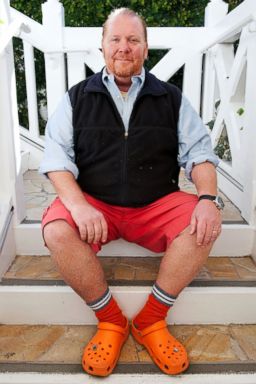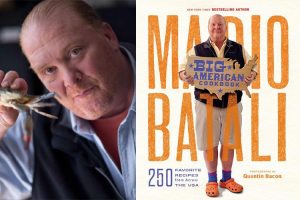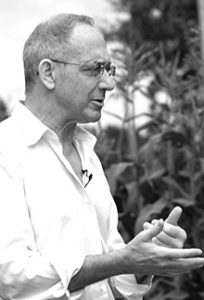
Yesterday, Steve Jaxon interviewed Mario Batali, who talked about his career and his new Big American Cookbook. Clark Wolf, Culinary Commodore and regular guest on The Drive, joins Steve for the interview. (Interview length: 13:08)
Steve Jaxon:
Joining us right now from, I do believe, his hometown in Seattle, the one and only Mario Batali. Mario!
Mario Batali: Hi, How are you guys? It’s nice to be here.
SJ: Good! Clark Wolf is with me.
Clark Wolf: Yeah, we just said hello. Hey, you know, I was just telling Steve that I’ve been to every one of your restaurants everywhere, Pó and Lupa and Babbo and Del Posto and the ones in Vegas and, I mean, you may be opening one right now as we’re speaking in a hotel, and also you’ve written a lot of books. And in all of your places, have a distinctly Mario version of Italian spirit and heart.
MB: Well, thank you!
CW: And they’re delicious, by the way. And you’ve decided to write a book that’s about American food. What’s the deal?
MB: Well, in traveling around and promoting all those books and opening all of those restaurants, I often wanted to escape the five-diamond five-star experience and go to where the locals ate, wherever they ate, whatever it was they ate. And in travelling that way and because I’m kind of a collector and a little bit of a hoarder, I’ll admit, I collected recipes from all these places that I went. I never asked them to write them down. I just asked them to tell me about the dishes. And I kind of studied them and I collected about a thousand, so we edited it down to about two-fifty. And these are kind of from all over the country in places I stopped, not necessarily fancy dishes, not necessarily tongue-in-cheek funny dishes, these are just dishes that I found to be the most delicious and the most ones that expressed to me the way the wind smells on a Thursday afternoon on Main Street in Des Moines.
SJ: Very cool.
CW: Depending on where you’re standing.
SJ: And the book is out now, and folks, if you buy a ticket and see Mario with Dusky on Thursday, you get a copy of the brand new book as well.
Let me ask you this, man. You were raised in Seattle but somehow you ended up attending high school in Madrid. How did that happen?
High School in Madrid
MB: Yeah, very lucky. Well, my Dad worked with Boeing, and we had this big chance to move to Spain and Dad would travel around and kind of understand, managed the heat treatment facilities, how they took airplane parts and made them stronger by heating them up and then dipping them into other things. And they built factories around Europe, in France and in Spain and in Israel, and at the time in Yugoslavia, and so we traveled a little bit but we stayed centered in Spain. We were lucky enough to get there about the time that Franco died. And we just had… it was an eye-opener for our family, because at that point Spain didn’t really have much TV. So at the end of the dinner every night, we were stuck talking to each other. For two or three years on end! So we really got to know each other in a better way and it was a different experience for all of us. Plus, we got to really see and understand gastronomy from a European point of view, which was just a fascinating wake-up.
SJ: Wow, that is so cool. And, back to Dusky Estes and John Stewart, her husband, you know them, apparently. Dusky was in last week and said that you taught John how to gut a pig.
Mario Batali: Yeah, we’re old friends from a long… many many pigs ago. And we’re just friends in the restaurant industry. We work on many things in very similar veins. Their food is as delicious as I hope my food is and they’re both fun and funny and smart and everything American cooks should want to be. They’re true idols of mine and I’m looking forward to being able to hang out with them.
CW: They are great friends and they are great family members in the family of food.
MB: Right.
CW: In Casa Mono, a restaurant you’ve been involved with, I don’t know how you’re involved with it still, but you had a lot to do with the beginning of that restaurant, right?
MB: I still own it.
CW: Oh, all right, well then there is that! There is a kind of a Spanish sensibility which is now a little bit more explained by your long evenings with the family,
MB: Right.
CW: …but there’s still a personal sense of that restaurant. How do you think this new book reflects your experience in a personal Mario kind of way?
MB: Well, as I’ve travelled around and seen all of these dishes, in their place, I was very intent not on Mario-izing them. These aren’t really jacked up, they aren’t really changed from their very traditional thing, but what you’ll see at the bottom of a lot of the recipes, in orange print, is a little suggestion on how I might make it a little more like what I would make if I wasn’t following the recipe.
CW: Ah!
MB: My advice to people is, once a month, try to cook exactly from a recipe book exactly as it is, measuring everything, following the timing and cues, because as we cook, all of us, we develop our own personal styles, and even though we look at cookbooks, we don’t really follow the recipe. If you follow the recipe I think you’ll find different kinds of flavor palettes than you expected. Because we tend to put the same amount of lemon or the same amount of salt or cook things for the same amount of time when we cook them at our house. So we have things that we find are pleasing and delicious to us, but if you follow the recipe exactly, I think you’ll find a whole new thing goes on in your palette.
SJ: Wow. Well put.
MB: Thank you!
SJ: I’m big on people’s history. So, you grew up in Seattle, wound up doing high school in Madrid. After Madrid, what happened and how did you become who you are today?
Falling in Love with New Jersey
Mario Batali: Well, I went to Rutgers, the state university of New Jersey. I’d never even been to the East Coast. When I went to college, the furthest east I had ever been was Idaho. I fell in love with New Jersey, I fell in love with proximity to New York, I fell in love with the whole kind of Italian-American experience, I fell in love with Bruce Springsteen, the Jersey Shore, egg cream, pastrami sandwiches, the Jewish deli experience, and it really further just reinstated my love for food. And I realized by the time I graduated from college, that I wasn’t going to go into either some academic or kind of a financial management field, that I really wanted to be a cook.
While I was studying in college, I was working in a pizzeria in New Brunswick, New Jersey, called Stuff Your Face, making strombolis and pizzas and I fell in love with this passionate experience called dinner rush, every night. So that’s what really got me kicked off.
CW: All right, Mario, while we have you for a second. How do you explain the fact that you’ve been on all kinds of television shows and you’ve never made me feel like you weren’t really you, on that show. You know, so often, when you get in front of, when people get in front of the camera, they tend to do this thing, that distorts who they really are in a way that makes… I don’t know, you know what I’m talking about.
MB: Yeah, yeah, of course.
CW: And you’re always the guy on the show that manages to ask a real question in a real way, entertaining and engaging but not phony. How do you do it?

Mario Batali and his famous orange Crocs.
MB: You know, I’m lucky, I’ve been on a lot of camera, in front of a camera a lot. What being in front of a camera a lot does, or any media form, is it makes you more like you. It won’t make you more or less shy, it won’t make you more or less entertaining. But it gives you the opportunity to relax into your own skin. And I’m just lucky enough to feel very relaxed. I’m also very inquisitive, I’m very curious about other people’s stuff. I love to hear other people’s stories and their travels and their things. So I think it’s my natural inquisitiveness that makes everyone kind of feel relaxed like they’re already comfortable when I’m talking.
SJ: Well, you come across as such a nice guy too, I bet you’re a sweetheart, I can’t wait to meet you. It’s Mario Batali and The Big American Cookbook, 250 favorite recipes from across the USA. If you buy a ticket to see Mario with Dusty Estes at the LBC Thursday, you get a copy of the book too and you’ll be doing some book signings and such afterwards.
MB: Fantastic.
SJ: Didn’t you study in Europe after college, at some point?
MB: After college I went to the Cordon Bleu in London and I studied there for about six of the eight months, then I dropped out and I worked for a guy named Marco Pierre White.
CW: Whoa!
MB: At that point he still wasn’t famous but he was really talented. And what you can learn from a guy like Marco Pierre White is often how not to treat people as much as how to cook, so I learned both from him.
CW: Folks, the translation is that Mario’s a sweetheart and the other chef was, let’s just say, a little bit difficult with some folks. I’ve got to ask you about Otto, which is one of my favorites of your restaurants, which is on 8th Street, just off 5th Avenue. In fact, it’s in a building called One Fifth Avenue. You put vegetables in a little ramekin and offered ten or twelve different kinds, and you were the first person to serve olive oil ice cream, or gelato, in America. Was that a little freaky? Did people respond with their eyes crossed, at first?
MB: I think people appreciated the idea of the variety. They weren’t necessarily ready to go and have five different kinds of vegetables as their only antipasto. So we snuck in some head cheese and some prosciutto and some salami along the side. So Otto was a little bit ahead of its time, now its in the middle of its time. So people really understand how delicious and light food can be and how vegetable-forward it can be without having to say, We don’t want to be a vegan restaurant. We don’t want to be a vegetarian restaurant. But we want to be able to serve vegans and vegetarians in a way that makes everybody satisfied and no one feels like they’re missing out on anything.
CW: I love the idea that you don’t want Otto to peak too soon.
MB: Yeah, exactly. It’s twelve years old and we’re still climbing.
CW: You did another thing that makes you look great. What Frank Bruni called Four Star food with Rock-and-Roll at the bar. You created a three-star restaurant that people really loved to be able to come back to. And I’m talking about Babbo.
MB: Yes, I remember that review very clearly. He said, this could be a four-star restaurant, but can you really eat your bucatini while they’re blasting the Black Crowes. And the answer was, Well, Frank, if you’re going to have to take a star away from me for something, I’m happy that it’s the Black Crowes. I felt really good about it. The restaurant is still a three-star restaurant. It’s delightful hospitality. There is definitely a point of view. We definitely play music. It’s a palpably energetic restaurant when you walk in. You know you’re not in Kansas anymore, Toto. It’s really a New York City experience.
SJ: Mario Batali, the Big American Cookbook, the brand new book, 250 favorite recipes from across the USA.
I’m looking at the Amazon website. It says this was over two years in the making and I can understand, I mean, you travelled all over the country. So it was two years of traveling? How did…
MB: No, they’re crazy, it was like eighteen years of travelling. It took me two years to edit the one thousand recipes down to 250 that I thought would be absolutely perfect.
SJ: That makes sense.
CW: All right, what’s next? What do you want to do next? I mean, this is a great American think and it’s just exactly where Americans want to be right now, they’re getting back in the kitchen. I’m sure that Blue Apron will license some of these recipes for around the country. But if you were going to do another restaurant, somehow you’ve managed, in New York City, to open a restaurant, every time there seems to be a gap we didn’t know we had.
MB: I think right now what I’m concentrating on is trying to make sure that we’re ready to deal with all kind of increases in the costs and still have a sustainable opportunity to do it. Our next three projects that are already under construction are Eataly, in Boston, Los Angeles and Toronto, and I think that’s going to take me about a year. So I’m kind of holding the restaurants off and making sure we can still make profit and figure out how well we can do what we need to do.
SJ: Wow. Well, it’s Mario Batali, his new book, Big American Cookbook, 250 favorite recipes from across the USA. Are you wearing orange Crocs right now?
MB: I am wearing orange Crocs right now.
SJ: That is so cool. Every time I bring your name up over the last three weeks, everyone says, “Oh, orange Crocs!”
MB: Even Michelle Obama, in my introduction at the White House state dinner that I cooked last Tuesday, introduced me as the guy with the funny shoes.
SJ: I’m glad you brought that up because I meant to, thinking about it this morning, I wanted to ask you that and might have spaced it. Explain how that came about and what you did. It was a big tent on the White House lawn, right?
Cooking for the White House
MB: Ah, yeah, it was. I’ve known the Obamas since they first started in because I was a helper in their Let’s Move program. Mrs. Obama has been to the restaurant a couple of times in each of them and we just have a nice little rapport. Her team called and asked if I’d like to cook the last state dinner and it happened to be for Prime Minister Renzi of Italy. And it was so much of a resounding yes, I’ll do whatever you want. It didn’t even occur to me to ask if I could bring prepared food in, which of course, you can’t. I had to order all of the raw ingredients and take my crew of four down there to hand make three thousand agnolotti the day before the event. So, it was a lot more of a commitment than I thought, but it was so much fun and so cool to see Barak Obama wandering the halls of his home on his way to a press conference. It’s like, oh my god, I can’t believe it, it’s the greatest thing that ever happened.
SJ: Wow, man!
CW: I love the idea that, you have to remember, you have to bring the stuff in, because they don’t have tasters there.
MB: Right.
CW: We’ll all still wonder if Michelle had orange Crocs on under that Versace dress.
MB: Oh, boy, it looked good, didn’t it?
SJ: Mario Batali, the new book, The Big American Cookbook, 250 recipies from across the USA. He will be in conversation with his friend Dusky Estes at the LBC this Thursday, with Copperfields.
Mario, thank you so much for taking the time, man.
MB: Thanks for having me, guys, it’s always a pleasure.
SJ: We’re coming up on four o’clock, Clark… we’ll see you soon. [end]
For more information about Mario Batali, visit his website at www.mariobatali.com.
For more information about Clark Wolf, visit the website of The Clark Wolf Company.


